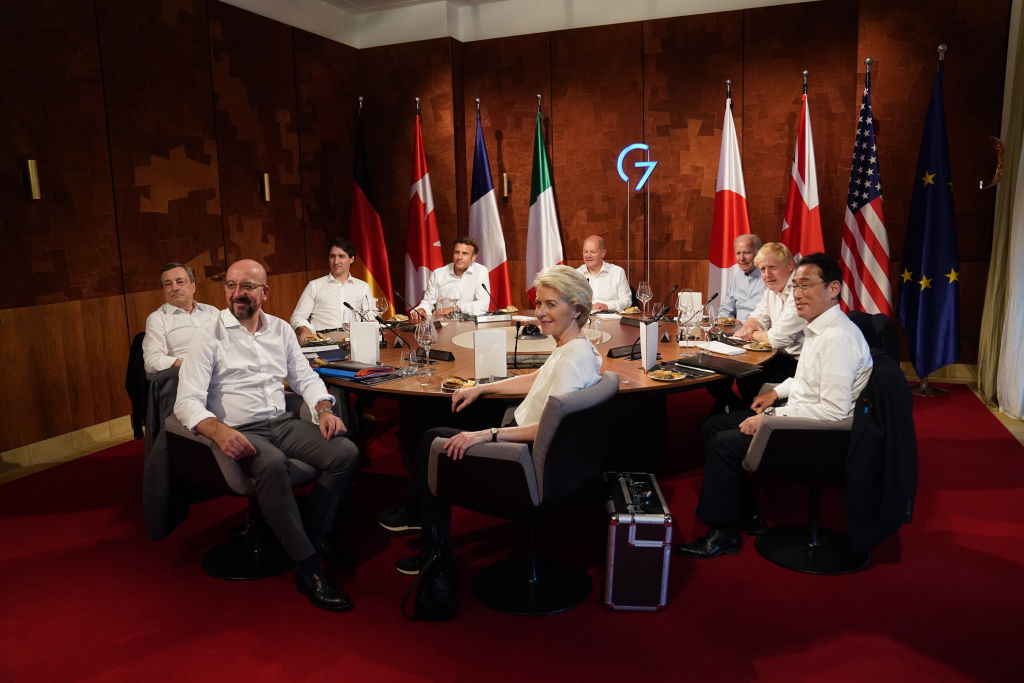G7 pledges to cap Russian oil as West ramps up sanctions on Kremlin

The Group of Seven (G7) is preparing to cap Russian oil as part of a fresh package of sanctions in response to Russia’s invasion of Ukraine.
At the summit in Germany, the group vowed to stand with Ukraine “for as long as it takes”, promising to load more pressure on Russia’s finances with new sanctions.
This includes plans to cap the price of Russian oil, which could be finalised today and announced as soon as tomorrow.
The expanded sanctions could also target the Kremlin’s revenue stream from gold exports, Russia’s military production and officials installed by Moscow in areas of Ukraine occupied by Russian forces.
In a statement, the G7 said: “We will continue to provide financial, humanitarian, military and diplomatic support and stand with Ukraine for as long as it takes,” the statement said.
The announcement follows news Russia in on the verge of its first sovereign default in decades.
A price cap would sanction bodies responsible for insuring Russian tankers if they permit oil to be sold above a fixed price.
Currently, 95 per cent of the world’s tanker liability coverage is arranged through a City of London-based insurance organisation called the International Group of Protection and Indemnity Clubs, which has to heed European law.
The G7 nations, which account for nearly half the world’s economic output, are determined to limit Russia’s capabilities, without stoking already soaring inflation.
It also believes the price cap will hit the Kremlin’s war chest while actually lowering energy prices.
Craig Erlam, senior market analyst at OANDA told City A.M. this would be “an incredibly difficult agreement to get over the line”.
He said: “The complexities associated and implications for already agreed sanctions will make life challenging. As will implementing a cap in a manner that those purchasing Russian crude agree to and actually abide by.”
“Even if these challenges are overcome, a price level would have to be agreed that achieves the goal of cutting off key revenues for the Kremlin without risking supplies being cut altogether which would be devastating for all.”
Meanwhile, European Union (EU) countries’ energy ministers are discussing options in Luxembourg this week for how they could jointly curb gas demand, as the bloc grapples with cuts to Russian flows, with the looming prospect of further supply shocks this winter.
The Commission will present an EU plan to coordinate preparations for further gas supply shocks in July.
EU energy commissioner Kadri Simson said: “I plan to present to ministers the concrete steps that I believe we have to make, both at member states’ side and the Commission’s side, to be better prepared.”
Italian Prime Minister Mario Draghi and French President Emmanuel Macron are reportedly in favour of a gas cap, where European countries would refuse to pay above an as-yet unspecified fixed price for Russian gas.
Liquid gas would be exempted from this maximum price.
Ole Hansen, head of commodity strategy at Saxon Bank was sceptical about the proposals.
Speaking to City A.M., he argued: “Gas import curbs can only be achieved by either cutting demand through high prices or government intervention and more ex-Russia imports. So far, both will be challenging to implement, the result being high prices for longer, and with that the risks of high energy consuming industries getting hurt.”
Today’s announcements follow continued conflict in the eastern regions of Ukraine, and Russia cutting off gas to multiple countries which refused to pay in roubles for supplies.
Germany has also triggered further stages of emergency plans following a 60 per cent reduction in Nord Stream 1 gas flows last week – which could eventually lead to the government taking over the distribution of its energy supplies.
Meanwhile, Ukraine’s largest state energy supplier has warned the country faces severe supply shortages this winter without funds to fill a shortfall of 5.8bn cubic meters of gas.
For context, British Gas owner Centrica’s massive deal with Equinor only covered 1bn cubic meters over three years.
The bloc is pushing for storage capacity to be at 80 per cent across the continent this winter to stave off supply shortages this winter.
Its storage levels are currently sitting at 57 per cent according to iGas.